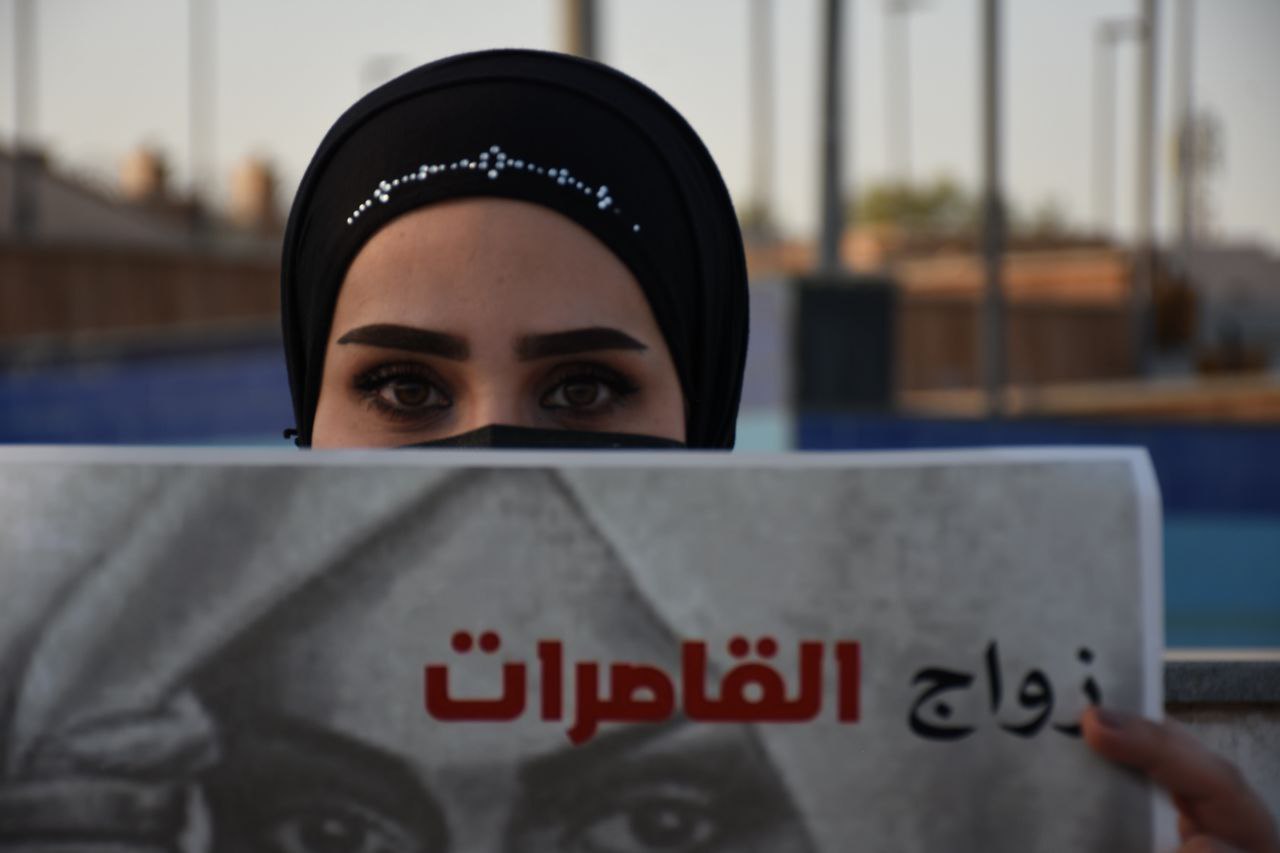The amendment to the Personal Status Law kept the age of marriage as it was and will not allow girls to marry at the age of nine, as proposed by conservative parties, which sparked protests at home and abroad.
The Iraqi Gazette published in its issue No. 4814 dated February 17, 2025 the text of the amendment to Personal Status Law No. 188 of 1959, thus entering into immediate effect.
According to the amendment, the Scientific Council is committed to ensuring that when drafting the code of Sharia rulings in personal status matters, it does not stipulate a reduction in the age of marriage and does not allow anything that contradicts what is stipulated in Article 8 of the Personal Status Law.
Under this paragraph of the new amendment, girls at the age of nine are not allowed to marry.
The first paragraph of Article 8 of the Personal Status Law states that “If a person who has completed the age of fifteen requests marriage, the judge may authorize it if he proves his/her eligibility and physical suitability after the approval of his legal guardian. If the guardian refuses, the judge shall request his approval within a period specified by him. If he does not object or his objection is not worthy of consideration, the judge shall authorize the marriage.
Girls at the age of nine are not allowed to marry
The second paragraph of this article states that “The judge may authorize the marriage of a person who has completed the age of fifteen if he finds an extreme necessity calling for it, and the condition for giving permission is the achievement of religious maturity and physical suitability.”
The concerns of women’s rights organizations, including international organizations, were that the proposed amendment to the law allows girls to marry at the age of nine, given that some sects permit marriage at this age. Moreover, the draft, before it was approved, did not include any paragraph regarding the age of marriage or obligate the Code of Sharia Jurisprudence to meet the age mentioned in the old law, the age of 15.

Last year, the European Parliament called for an immediate and complete rejection for the amendments of the Personal Status Law, stating it violates the basic rights of women, hurts the reputation of Iraq which might lead to halting foreign aids.
The European demands came within the framework of a decision issued on October 10, 2024 regarding the proposed amendments to the Personal Status Law in Iraq No. 188 of 1959, which sparked a wave of protests by organizations defending women's rights, including the "188 Alliance", which includes a number of civil society organizations and women's rights activists.
Both Amnesty International and Human Rights Watch expressed their concern about this step and published two reports protesting the amendment to the Personal Status Law, especially with regard to the marriage of girls at the age of nine.
According to a report issued by the Supreme Judicial Council in Iraq, early marriage is one of the main reasons behind the high divorce rates, while statistics from the United Nations showed that 28% of Iraqi girls marry before they reach the age of eighteen, and statistics from the United Nations Mission in Iraq (UNAMI) revealed that 22% of unregistered marriages are for girls under the age of 14.
This comes at a time when the United Nations warned that girls who are forced to marry before the age of 18 are more vulnerable to violence, threats and health problems.
In response to these protests, the Supreme Judicial Council in Iraq expressed its support for the proposed amendments to the law in a statement issued on September 22, 2024, and denied that it was a step to encourage early marriage. However, the Legal Committee of the Iraqi parliament pledged last September to take all concerns seriously into consideration.
The Supreme Judicial Council in Iraq expressed its support for the proposed amendments
The amendments by the Iraqi parliament are based on the provisions of Article 41 of the Iraqi Constitution, which states that “Iraqis are free to adhere to their personal status according to their religions, sects, beliefs or choices, and this shall be regulated by law.”
The amendment approved by the Iraqi Parliament on January 21, 2024 and currently in effect is different compared to the draft that had its first reading and its content has been changed, including the deletion of paragraphs and texts related to the Sunni sect, given that one of the reasons for passing the amendment was that it did not include the Sunni Muslim sect, which refused to accept it.
The amendment includes adding a third paragraph to Article Two of the Personal Status Law, one of whose points states that when concluding a marriage contract and registering it in the Personal Status Court, Iraqi Muslim man and woman have the option to have the provisions of the Muslim Shiite “Jaafari” sect applied to them and their minor children (under the age of 18) in all matters of personal status, and they do not have the right to change their choice later.
The Scientific Council of the Shiite Endowment Diwan, in cooperation with a number of judges and legal experts, in coordination with the State Council, is developing a code of Sharia rulings on personal status issues according to the Jaafari Shiite doctrine and referring it to the Iraqi parliament for approval within four months from the date of the law's implementation. The parliament was obligated to approve the code within 30 days and put it into effect.
Another paragraph of the draft amendment to the Personal Status Law, which sparked a wave of protests, relates to the ratification of marriage contracts concluded outside the court, but the paragraph was deleted during the approval.
The amendment also stated that the Code of Sharia Provisions established by the Shiite Endowment should not include any paragraph stipulating that the mother’s right to custody of a child – whether male or female – is less than seven years old or that which is inconsistent with the interests of the child in custody and those of his parents who do not have the right to custody in meeting and communicating with each other in an appropriate and suitable amount in terms of time and place. Rather, the court gives the child at the age of 15 the right to choose between the father or the mother.
With regard to the issue of polygamy, the Code of Sharia Provisions is committed to ensuring that there is no provision for violating what is stipulated in paragraphs 4 and 5 of Article 3 of the Personal Status Law, as paragraph 4 stipulates that it is not permissible to marry more than one except with the permission of the judge, and the following two conditions must be met in order to grant permission: that the husband has the financial sufficiency to support more than one wife. And that there is a legitimate interest, while paragraph 5 stipulates that if there is fear of injustice between wives, polygamy is not permissible and the judge’s discretion is left to decide.
According to the new amendment to the Personal Status Law, the husband and wife who concluded the marriage contract before the amendment may request the application of the provisions of the Jaafari Shiite sect to them and their minor children.
While the court is committed to implementing the provisions of the Code of Sharia Judgments in issuing any decision related to personal status matters (for those covered by the provisions of the Jaafari Shiite sect).
If there is a conflict in a case regarding the choice of the provisions of the Jaafari Shiite sect or the Personal Status Law, the court relies on the majority opinion or returns to the option that achieves justice.
The amendment to the Personal Status Law was not passed in 2014 and 2017, until the draft amendment to the law was submitted to the Presidency of the Iraqi Council of Representatives by lawmaker Raed Al-Maliki with the support of representatives and officials from the Shiite sect, including the Coordination Framework.
The first reading of the amendment took place on August 4, 2024, and the parliament sought to complete the second reading of the bill, but protests by some opposition MPs prevented the legal quorum for the session.
The second reading of the law took place on September 16 and was scheduled to be voted on in early October 2024, but was postponed until further notice. However, under an agreement between most of the Shiite blocs, Sunnis, Kurds and Turkmen, an amendment (the Personal Status Law in favor of the Shiites) was approved, in addition to two other laws, (the general amnesty in favor of the Sunni Arabs) and (the law to return real estate to its owners in favor of the Kurds and Turkmen) in one package.






